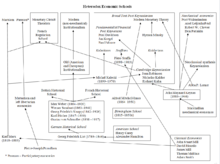| Part of a series on |
| Economics |
|---|
 |

Heterodox economics is a broad, relative term referring to schools of economic thought which are not commonly perceived as belonging to mainstream economics. There is no absolute definition of what constitutes heterodox economic thought, as it is defined in constrast to the most prominent, influential or popular schools of thought in a given time and place.[1]
Groups typically classed as heterodox in current discourse include the Austrian, ecological,[note 1] Marxist-historical, post-autistic, and modern monetary approaches.[2][3][4]
Four frames of analysis have been highlighted for their importance to heterodox thought: history, natural systems, uncertainty, and power.[5]
- ^ Dequench, David (2007) "Neoclassical, mainstream, orthodox, and heterodox economics", Journal of Post Keynesian Economics, 30 (2), 279-302 [1]
- ^ Frederic S. Lee, 2008. "heterodox economics," The New Palgrave Dictionary of Economics, 2nd Edition, v. 4, pp. 2–65. Abstract. Archived 2016-12-23 at the Wayback Machine
- ^ Cohn, Steve (2003). "Common Ground Critiques of Neoclassical Principles Texts". Post-Autistic Economics Review (18, article 3). Archived from the original on 2019-08-27. Retrieved 2010-10-06.
- ^ Lawson, T. (2005). "The nature of heterodox economics" (PDF). Cambridge Journal of Economics. 30 (4): 483–505. doi:10.1093/cje/bei093. Archived (PDF) from the original on 2011-09-28. Retrieved 2010-03-30.
- ^ Mearman, Andrew (2011). "Who Do Heterodox Economists Think They Are?" American Journal of Economics and Sociology, 70(2): 480–510 Archived 2016-03-05 at the Wayback Machine.
Cite error: There are <ref group=note> tags on this page, but the references will not show without a {{reflist|group=note}} template (see the help page).